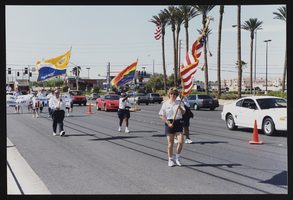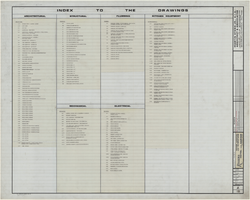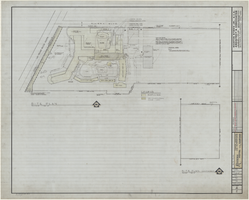Search the Special Collections and Archives Portal
Search Results
Lawrence Nelson oral history interview
Identifier
Abstract
Oral history interview with Lawrence Nelson conducted by John Turner on February 22, 1977 for the Ralph Roske Oral History Project on Early Las Vegas. In this interview, Nelson discusses the history of early Las Vegas, Nevada. He talks about the Old Mormon Fort, the importance of railroads in Las Vegas, and the construction of the Boulder (Hoover) Dam.
Archival Collection
Joyce Moore oral history interview
Identifier
Abstract
Oral history interview with Joyce Moore conducted by Claytee D. White on January 22, 2013 for the Boyer Early Las Vegas Oral History Project. Moore discusses her early life growing up in Las Vegas, Nevada and attending Rancho High School with her brother. She also talks about how Las Vegas changed as she grew older.
Archival Collection
Valerie Wiener's oral history for UNLV Libraries Southern Nevada Jewish Heritage Project, 2015
Level of Description
Archival Collection
Collection Name: Valerie Wiener Papers
Box/Folder: Box 08
Archival Component

Long Beach Lesbian and Gay Pride, Inc. in the third annual Gay Pride parade: photographic print
Date
Archival Collection
Description
Image
Las Vegas, Nevada gay bars and individuals, San Francisco, California film project with Bill Schafer: photographic prints, approximately 1980 to 2010
Level of Description
Archival Collection
Collection Name: Bill Schafer Papers
Box/Folder: Box 01
Archival Component


Philip Murphy oral history interview
Identifier
Abstract
Oral history interview with Philip Murphy conducted by Stephen Johnson on January 22, 1972 for the Ralph Roske Oral History Project on Early Las Vegas. Murphy shares his memories of growing up in St. Thomas, Nevada. He also talks about the growth of Southern Nevada as people moved towards the west.
Archival Collection
Henry Shepherd oral history interview
Identifier
Abstract
Oral history interview with Henry Shepherd conducted by Claytee D. White on October 22, 2014 for the Boyer Early Las Vegas Oral History Project. Shepherd discusses being an African-American bartender on the Las Vegas, Nevada Strip, hired as a result of the 1971 consent decree. He also recalls memories of Jackson Street, the homes in North Las Vegas, and the hotels in downtown Las Vegas and on the Strip.
Archival Collection
Claytee D. White oral history interview
Identifier
Abstract
Oral history interview with Claytee D. White conducted by Stefani Evans on November 2, 2023 for the African Americans in Las Vegas: a Collaborative Oral History Project. In this interview, Claytee D. White, founding directory of the Oral History Research Center at UNLV Libraries, celebrates the twentieth anniversary of the OHRC by contributing her oral history to the collection.
She begins by explaining how the system of sharecropping worked in her family near rural Ahoskie, North Carolina, and she talks about the field work involved in raising cotton, tobacco, corn, and peanuts. The fifth of eight children and the first daughter, she shares memories of going into town with her mother, of admiring her women teachers, and of attending North Carolina Central College (now University) for two years before moving to Washington, D.C., and working for the telephone company.
After recalling her two years in D.C. and 22 years in Los Angeles, California, she describes "running away" to Las Vegas, Nevada in the early 1990s. Here, at the History department at UNLV, she recalls learning to conduct oral histories. White shares memories of her first interviews with Hazel and Jimmy Gay and Lucille Bryant. She talks of matriculating to the College of William and Mary for her PhD and of returning to Bertie County to live with her mother and administer the office of The Shaw University Center for Alternative Programs in Education (CAPE). She describes how she was offered the position of OHRC founding director, why it matters that she was an "opportunity hire," and how it feels to be the only Black person in a room.
Archival Collection
